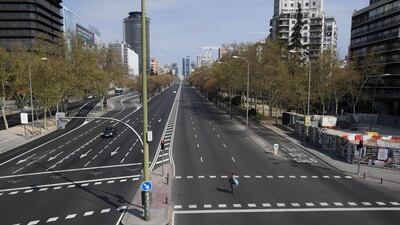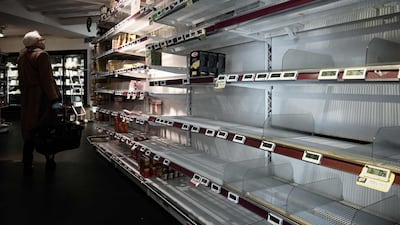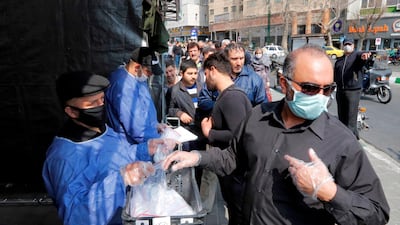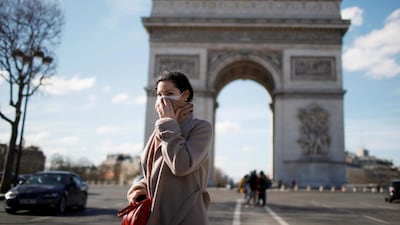France has announced near-total lockdown as borders with non-EU countries closed and all non-essential movement of people was banned in new measures to limit the coronavirus pandemic.
In a televised address to the nation on Monday night, Mr Macron admitted his country was “at war” with an enemy that was as menacing as an army.
That followed dire warnings from France’s director general of health, Jerome Salomon, that the outbreak's spread had become “very worrying” and reflected rapidly deteriorating conditions.
From noon on Tuesday, people must stay at home for at least 15 days except for essential movement, which includes shopping and going to work, if working from home is not possible.
But that does not include family or social gatherings, and sanctions will be imposed for breaches of the order.
The French army will take sick people to hospital, next Sunday’s second round of local elections will be postponed and household bills for utilities will be suspended.
Controversial reforms, such as the bitterly contested review of France’s pensions system, will be put on hold.
Amid growing fears for industry and employment, Mr Macron promised that no business, large or small, would be allowed to fail as a result of the crisis.
Drastic measures already taken included closing restaurants, schools, universities and the Eiffel Tower, the palace of Versailles and the Louvre, among world-famous tourist attractions.
But too many people remained complacent about contact with others and continued to socialise in defiance of medical advice.
Mr Macron said the closing of borders would prevent access between EU countries and those outside the 22-nation Schengen area.
Germany had already severely limited crossings to and from France.
Citizens from the UK would be exempt from this rule, even though it left the EU on January 31.
Mr Macron appears to have pre-empted a decision to be made by the EU as a whole.
But earlier, the EU Commission’s President Ursula von der Leyen said that as UK nationals remained EU citizens during the Brexit transition, cross-Channel travel would not be affected by proposed restrictions.
Only hours after French TV mocked “Anglo-Saxons” such as the British and Australians for panic-buying toilet roll and other household products, it was reporting similar scenes of stockpiling and empty shelves in France.
There are widespread reports of supermarkets being “taken by storm” as families prepare for the prospect of being confined to home.
France is a country where touch is an important sense, with protracted rituals of kissing and shaking hands at every meeting.
Mr Salomon, talking to the France Inter radio station, made it clear that such customs could not be maintained with the aggressively virulent disease.
Calling for a “general mobilisation of all French people” to fight the virus by acting as a barrier against its spread, he said the recommended distance of one metre between people was not being respected.
Mr Salomon was dismayed at reports from the weekend showing crowded public parks.
"We still have people meeting, seeing one another in large numbers, bringing together children and older people,” he said.
“The French must understand something – perhaps we have not explained enough – that we can all carry the virus without knowing it.
"Our loved ones, our children, our friends, our colleagues can be carriers because they will be sick in the coming hours or because they have minor symptoms that they do not even report.
"They have a little sore throat or slight headache, they are not paying attention and therefore they transmit the virus.”
Urging “hugely diminished contact”, Mr Salomon said this translated as seeing no more than a few people daily rather than 50 or 100.
He said it was a message he feared was simply “not getting through”, as demonstrated by the arrival of new patients at hospitals “every day, every hour".
Even before the week began with the likelihood of increasingly severe restrictions on daily life, much of France was feeling demoralised.
The French attach enormous importance to home life, famously putting family time ahead of opportunities to earn more by working longer.
“Life has become monotonous,” says Marie-Noelle, 70, in the department of la Sarthe, south-west of Paris.
“We already don't go out any more. We no longer see our three children and eight grandchildren.
"I have stopped going to aqua-gym, shopping is done online or drive-and-collect, cinema seats were restricted to every other row and now they’ve had to close anyway.
“One son is working from home, the other is likely to be laid off and our daughter’s work in psychiatry means she may be called up to help confined patients.
"We are healthy and have stocked up on essentials but at least neighbours have set up a system to supply older residents. But the atmosphere is one of hysteria.”
Marie-Noelle and her husband were disgusted that the first round of municipal elections went ahead on Sunday despite the government’s earlier announcement that all public places “not essential to the life of the country” should close.
The turnout nationally was below half, a record low.
Mr Macron’s centrist candidates generally fared badly and next Sunday’s run-offs are now in doubt.
One prominent candidate, former health minister Agnes Buzyn, was placed only third in the first round in Paris behind the socialist mayor, Anne Hidalgo, and the centre-right contestant Rachida Dati.
Ms Buzyn announced she was suspending her campaign for the second round because of the worsening crisis, without withdrawing from the race.
French children, excluded from schools from Monday for at least three weeks, have begun lessons at home through the internet.
Working parents have been urged to share childcare duties with alternating absences from their jobs but contact with grandparents is firmly discouraged to protect the elderly.
Renault and giant French car maker PSA, with brands including Vauxhall, Peugeot and Opel, have announced the suspension of production.
Public transport is being reduced and Air France expects the number of seats offered on flights to decrease by between 70 and 90 per cent over the next two months.
In Britain, despite the reluctance of Boris Johnson’s government to close schools, lycees and other French educational establishments were closed until further notice.
The number of deaths from the virus increased by a third to 127 on figures up to Sunday, with a total of 5,423 cases recorded.
“It’s a real health and economic disaster,” said Corinne, a nurse living on the Mediterranean coast in the southern Var department.
“My daughter works at a major hotel in Cannes and they’re having to lay people off as rooms empty and reservations are cancelled en bloc.
"I’m just crossing my fingers that I don’t catch this wretched thing.
"I’m avoiding the gym and keep a good distance when meeting anyone but it has to be said, the authorities are not very reassuring.”
But some French traditions seem immune even from a serious health crisis.
The Yellow Vest protests against government economic policy, although greatly diminished since they began in November 2018, have not been suspended.
Despite a ban on gatherings of more than 100 people, hundreds demonstrated in central Paris at the weekend with the usual disorder and arrests.
















